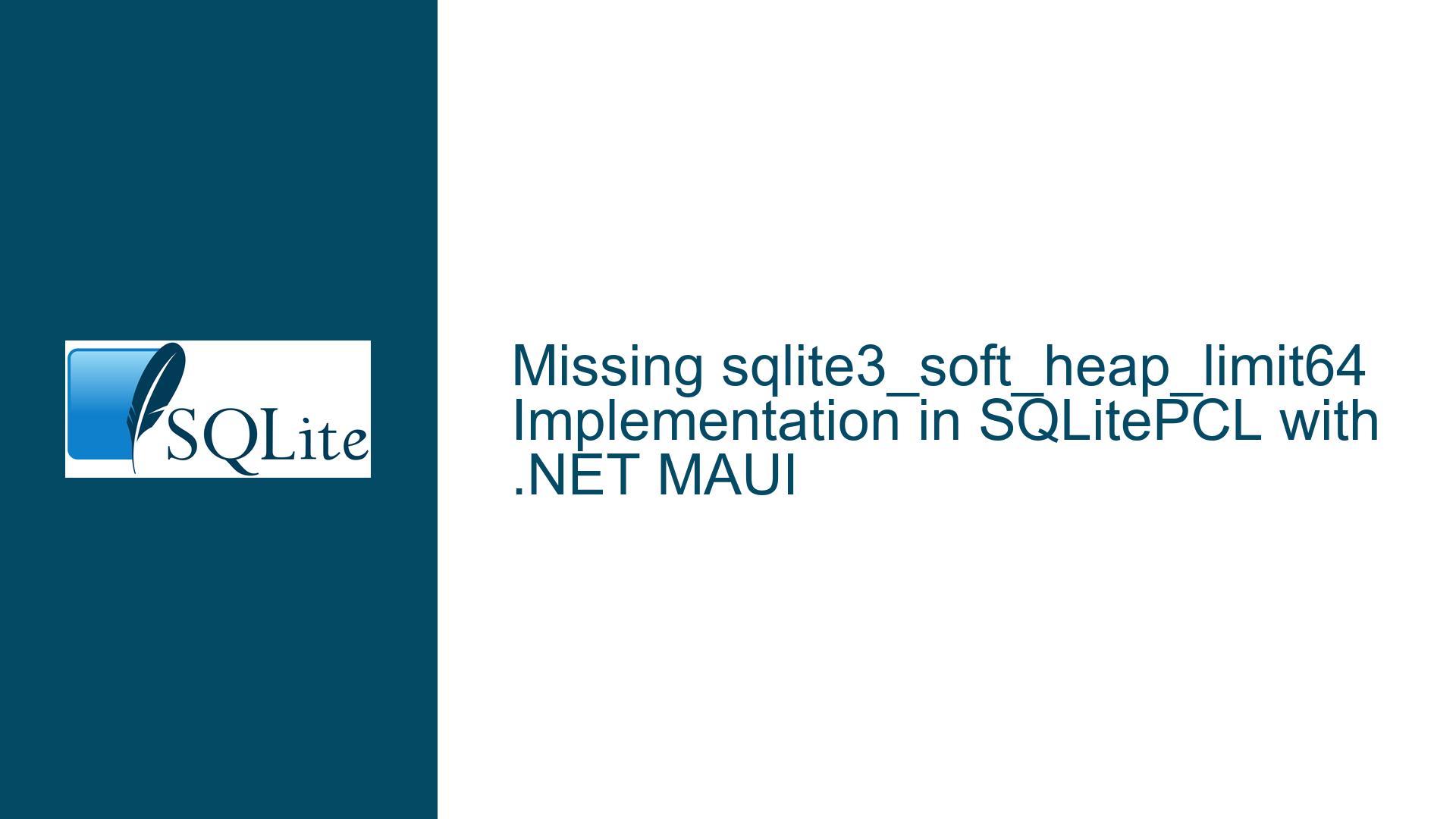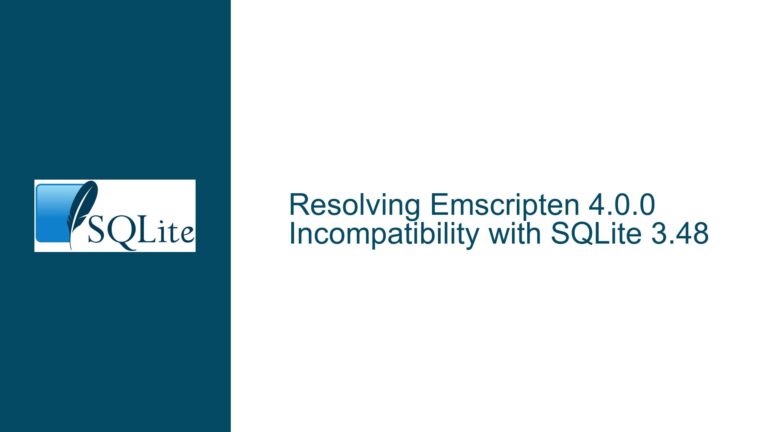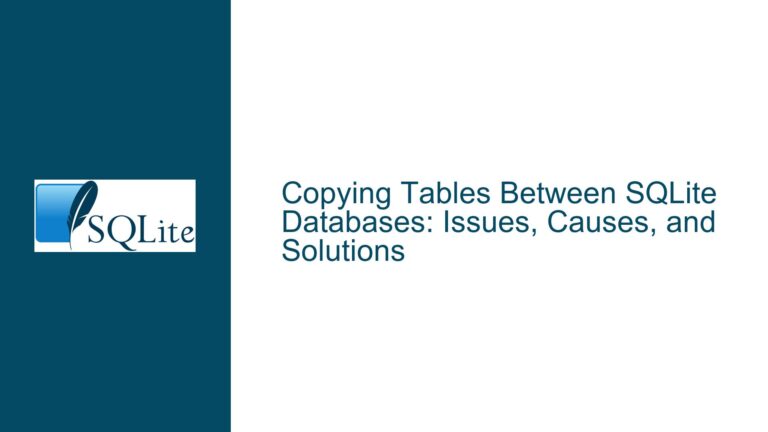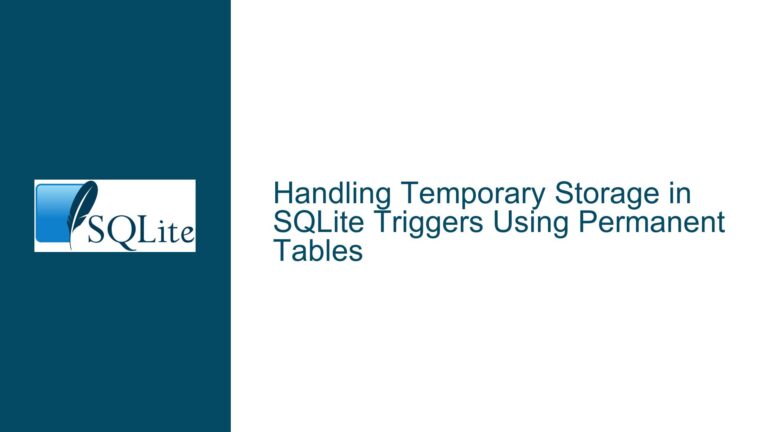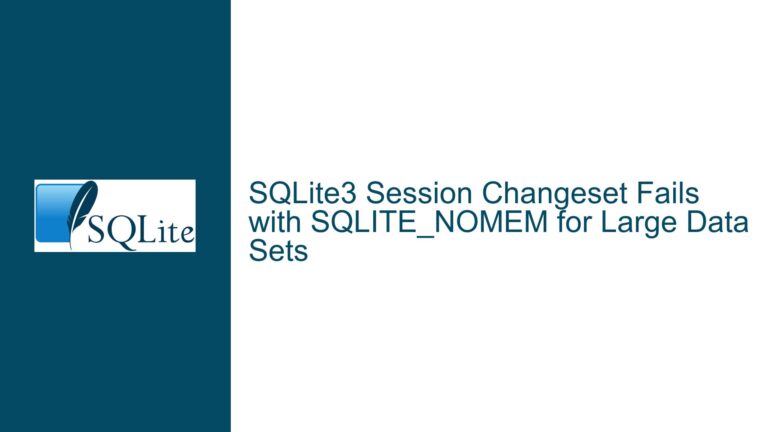Missing sqlite3_soft_heap_limit64 Implementation in SQLitePCL with .NET MAUI
SQLitePCL Dynamic Provider Initialization Failure in .NET MAUI Applications
1. Core Symptoms and Context of the SQLitePCL Dynamic Provider Initialization Error
The error Method 'sqlite3_soft_heap_limit64' in type 'SQLitePCL.SQLite3Provider_dynamic_cdecl' [...] does not have an implementation occurs during runtime initialization of SQLite in a .NET MAUI application. This error halts database creation workflows and is tied to the SQLitePCLRaw library’s dynamic provider initialization process. The failure manifests explicitly when the application attempts to call SQLitePCL.Batteries_V2.Init(), a method designed to configure the SQLite provider at runtime. The SQLite3Provider_dynamic_cdecl type is part of the SQLitePCLRaw.provider.dynamic_cdecl assembly, which acts as a bridge between managed .NET code and the native SQLite library. The missing method sqlite3_soft_heap_limit64 is a critical part of SQLite’s memory management API, and its absence indicates a mismatch between the expected native SQLite symbols and the actual implementation loaded at runtime.
The error is specific to scenarios where the SQLitePCLRaw library cannot resolve or bind to the native SQLite functions required by the dynamic provider. This typically occurs in cross-platform environments like .NET MAUI, where platform-specific native binaries must be correctly bundled and initialized. The Batteries_V2.Init() method is responsible for selecting the appropriate SQLite provider based on the target platform (e.g., Android, iOS, Windows) and ensuring that the native SQLite library is properly loaded. When this process fails, the managed code cannot locate the native function pointers, leading to the "method not implemented" exception.
A critical observation here is that the error arises despite the developer including the SQLitePCL.Batteries_V2.Init() call in the application’s startup logic. This suggests that the initialization routine is either incomplete, misconfigured, or encountering a dependency resolution failure. The SQLitePCLRaw library relies on a chain of dependencies, including platform-specific native binaries and managed provider assemblies, which must all align in version and configuration. A break in this chain—such as a missing native library or an incompatible provider assembly—triggers the runtime binding failure.
2. Underlying Factors Leading to the Missing sqlite3_soft_heap_limit64 Implementation
The root cause of this error revolves around incorrect or incomplete integration of SQLitePCLRaw packages into the .NET MAUI solution. SQLitePCLRaw is a modular library suite that decouples the managed SQLite API from the native implementation. The dynamic_cdecl provider dynamically links to the native SQLite library at runtime using platform-specific mechanisms (e.g., dlopen on Unix-like systems, LoadLibrary on Windows). For this to work, the following must align:
NuGet Package Installation Scope: .NET MAUI solutions often consist of multiple projects, including platform-specific heads (e.g.,
MyApp.Android,MyApp.iOS) and a shared code project. SQLitePCLRaw packages must be installed in all projects that interact with SQLite, including platform-specific projects. Installing these packages only in the shared project leads to incomplete provider initialization, as platform-specific binaries are not included in the final build output. The dynamic provider relies on these binaries to resolve native symbols likesqlite3_soft_heap_limit64.Version Mismatch Between SQLitePCLRaw Components: The SQLitePCLRaw ecosystem includes several interdependent packages (e.g.,
SQLitePCLRaw.core,SQLitePCLRaw.provider.dynamic_cdecl,SQLitePCLRaw.bundle_e_sqlite3). A version mismatch between these components can result in missing method implementations. For example, if thedynamic_cdeclprovider is built against a different version ofSQLitePCLRaw.corethan the one referenced in the application, method signatures may not align, causing binding failures.Native Library Deployment Issues: The
dynamic_cdeclprovider requires the native SQLite library (e.g.,e_sqlite3.dll,libe_sqlite3.so,libe_sqlite3.dylib) to be present in the application’s runtime directory. In .NET MAUI, platform-specific build tasks are responsible for embedding these libraries into the app bundle. If the build process fails to include the correct native binary for the target platform, the dynamic provider cannot load it, leading to unresolved symbols likesqlite3_soft_heap_limit64.Incorrect Initialization Order or Context: The
Batteries_V2.Init()method must be called before any SQLite operations are attempted. If database initialization occurs earlier in the application lifecycle—for instance, in a static constructor or during UI component initialization—the provider may not be fully configured, resulting in missing method bindings. Additionally, platform-specific constraints (e.g., Android’s restrictive linking environment) may require explicit initialization steps beyond the basicBatteries_V2.Init()call.
3. Comprehensive Resolution Strategy for SQLitePCL Dynamic Provider Initialization Failures
Step 1: Validate NuGet Package Installation Across the Entire Solution
Ensure that all SQLitePCLRaw-related packages are installed in every project within the .NET MAUI solution. This includes:
- The shared project (e.g.,
MyApp), - Platform-specific projects (e.g.,
MyApp.Android,MyApp.iOS,MyApp.WinUI), - Any class libraries referenced by these projects.
Use the NuGet Package Manager to verify that the following packages are installed consistently:
SQLitePCLRaw.core,SQLitePCLRaw.provider.dynamic_cdecl,SQLitePCLRaw.bundle_e_sqlite3(optional, but recommended for baseline SQLite integration).
Inconsistent package installation is a common cause of missing native binaries and provider assemblies. Reinstalling these packages with the same version across all projects ensures that platform-specific build tasks execute correctly, embedding the required native libraries.
Step 2: Enforce Version Consistency Across SQLitePCLRaw Dependencies
Open the .csproj files for each project and inspect the versions of all SQLitePCLRaw packages. Mismatched versions (e.g., SQLitePCLRaw.core v2.0.4 in one project and v2.0.5 in another) can lead to type resolution failures. Update all packages to the same version using the NuGet Package Manager or by manually editing the project files. For example:
<PackageReference Include="SQLitePCLRaw.core" Version="2.1.0" />
<PackageReference Include="SQLitePCLRaw.provider.dynamic_cdecl" Version="2.1.0" />
Step 3: Verify Native Library Inclusion in Platform-Specific Builds
Each platform has distinct requirements for native library deployment:
- Android: The native library
libe_sqlite3.soshould be included in thearmeabi-v7a,arm64-v8a,x86, andx86_64directories underResources\lib. - iOS/macOS: The
libe_sqlite3.dylibbinary must be present in the app bundle’sFrameworksdirectory. - Windows:
e_sqlite3.dllshould be copied to the output directory.
Inspect the build output directory (bin\Debug or bin\Release) to confirm that these libraries are present. If absent, the SQLitePCLRaw bundle packages may not be properly configured. Reinstalling the SQLitePCLRaw.bundle_e_sqlite3 package often resolves this.
Step 4: Ensure Correct Initialization Sequence
Modify the application’s startup code to call SQLitePCL.Batteries_V2.Init() immediately after the application instance is created. In .NET MAUI, this is typically in MauiProgram.cs:
var builder = MauiApp.CreateBuilder();
builder
.UseMauiApp<App>()
.ConfigureFonts(fonts => { /* ... */ });
// Initialize SQLitePCL after builder configuration but before services are built
SQLitePCL.Batteries_V2.Init();
var app = builder.Build();
return app;
Delaying initialization until after services are built or database operations have started can result in race conditions where the provider is not ready.
Step 5: Diagnose Platform-Specific Runtime Environments
Some platforms impose restrictions on dynamic library loading:
- Android: The
dynamic_cdeclprovider usesSystem.LoadLibraryto loadlibe_sqlite3.so. If the library is not in the expected location or has unmet dependencies (e.g., missinglibc++_shared.so), the load will fail. Use Android logging to capturedlopenerrors during startup. - iOS: Dynamic loading is heavily restricted. Consider using the
bundle_e_sqlite3provider instead, which statically links SQLite into the application. - Windows: Ensure that the Visual C++ Redistributable is installed, as the native SQLite binary may depend on it.
Step 6: Clean and Rebuild the Solution
Build artifacts from previous configurations can persist and cause version conflicts. Perform a full clean and rebuild:
- Delete the
binandobjdirectories in all projects. - Restart Visual Studio to clear in-memory caches.
- Rebuild the solution from scratch.
Step 7: Fallback to a Static SQLite Bundle
If the dynamic provider continues to fail, switch to the bundle_e_sqlite3 provider, which embeds a static SQLite build into the managed assembly. Replace the dynamic_cdecl package with:
<PackageReference Include="SQLitePCLRaw.provider.e_sqlite3" Version="2.1.0" />
Update the initialization code to:
SQLitePCL.Batteries_V2.Init();
SQLitePCL.raw.SetProvider(new SQLitePCL.SQLite3Provider_e_sqlite3());
This bypasses dynamic loading entirely, eliminating the missing method error.
By systematically addressing package installation scopes, version alignment, native library deployment, and initialization sequencing, developers can resolve the sqlite3_soft_heap_limit64 implementation error and ensure robust SQLite integration in .NET MAUI applications.
